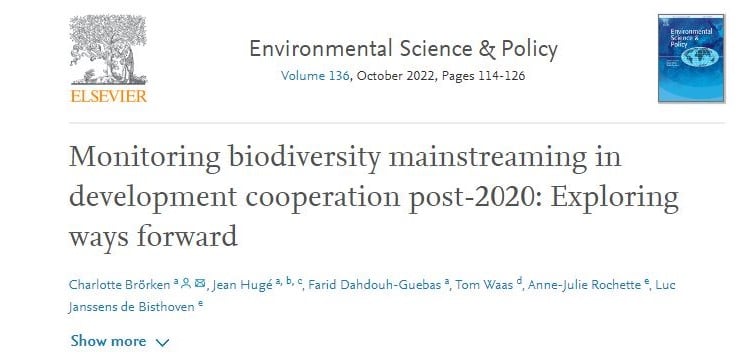News
Monitoring biodiversity mainstreaming in development cooperation post-2020: Exploring ways forward

This new publication in the framework of CEBioS has just been published in Environmental Science & Policy.
- Publication
- 16.06.2022
- Visit this link for more details
More info about the News item
“Monitoring biodiversity mainstreaming in development cooperation post-2020: Exploring ways forward”, by Brörken et al. (2022), is available on ScienceDirect.
Abstract
“From 2022 onwards the Post-2020 Global Biodiversity Framework (GBF) of the Convention on Biological Diversity will guide biodiversity conservation actions worldwide, which includes mainstreaming biodiversity into a wide range of activities, sectors and policies. Biodiversity mainstreaming in development cooperation is particularly relevant given the direct dependence of many communities in the Global South on biodiversity and on the benefits it provides. We conducted a Delphi survey among development cooperation practitioners at the aid provider (donor) side, to gain insight into current and future (post-2020 Global Biodiversity Framework) biodiversity mainstreaming and its monitoring. Our results demonstrate that despite efforts towards biodiversity mainstreaming and its monitoring, biodiversity mainstreaming indicators remain inconsistent and difficult to compare. The lack of biodiversity data, as well as their low accessibility and suboptimal use, and the inherent complexity of addressing biodiversity loss are considered key challenges. Respondents indicated that they strongly orient their own biodiversity mainstreaming and monitoring approaches towards international biodiversity governance dynamics. We conclude that, at least on paper, the indicator ambitions of the Post-2020 Global Biodiversity Framework are in line with the expectations and challenges of aid providers with respect to biodiversity mainstreaming. However, future effective mainstreaming of biodiversity requires indicator-based monitoring, exchange of good practices among aid partners, and a continued focus on awareness-raising regarding the linkages between biodiversity conservation and poverty reduction.“




